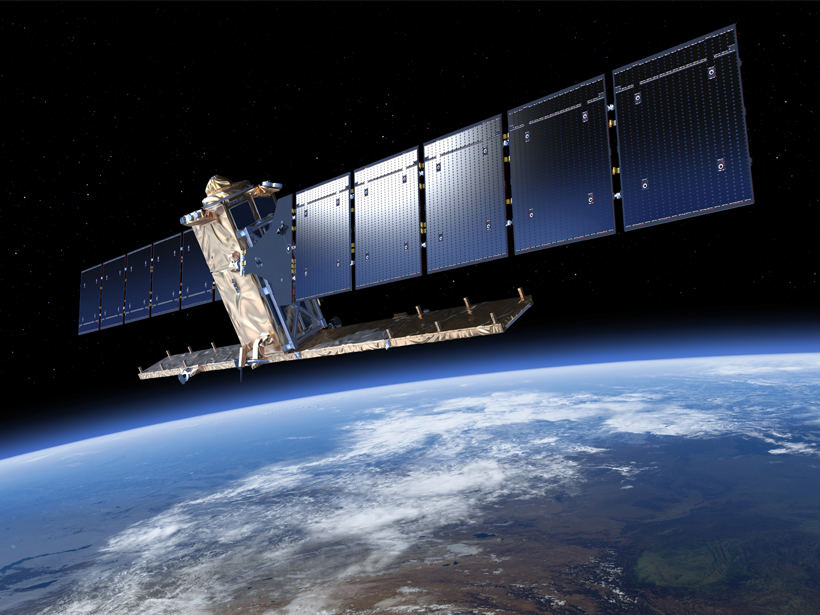With the space surrounding Earth becoming more congested, Europe and the United States should build upon their history of space cooperation with additional joint efforts to promote responsible behavior in space and ward off dangers to their spacecraft, experts on space policy and hazards urged at a recent meeting.
Enhanced cooperation would better shield satellites against natural and manmade threats, offer solutions to global concerns such as the need for improved navigation systems, and protect “our shared values across the globe and into deep space,” David O’Sullivan, European Union (EU) ambassador to the United States, said at the 9 December forum at the Center for Strategic and International Studies in Washington, D.C.
Cooperation and Autonomy
If the European Union and the United States can set a navigation satellite system standard, “we are hopeful that will send exactly the right signal to other countries,” Margolis said.
One example of cooperation already under way, O’Sullivan noted, involves the EU’s Earth observation program Copernicus, which currently has two Sentinel satellites in orbit. In October, the United States and EU agreed to share the Sentinel satellites’ data.
Another involves the American GPS system and EU’s flight navigation system Galileo, which has 10 satellites in orbit and 2 more scheduled for a 17 December launch. The United States and EU are working closely together on interoperability and compatibility between the systems for civilian and security use, O’Sullivan said.
The United States and Europe favor establishing interoperability and compatibility among all global navigation satellite systems, and the coordination between Galileo and GPS could serve as a model for that, said Jonathan Margolis, deputy assistant secretary for science, space, and health at the U.S. Department of State. “If the EU and the United States can set that standard going forward,” Margolis said, “we are hopeful that will send exactly the right signal to other countries and exactly the right signal to commercial operators as well.”

Alain Ratier, director-general of the European Organisation for the Exploitation of Meteorological Satellites (EUMETSAT), pointed to another cooperative endeavor, the Initial Joint Polar System, which began in 1998. A 2 December agreement between EUMETSAT and the National Oceanic and Atmospheric Administration extends until 2040 this cooperation on a system of polar-orbiting satellites to provide global weather observations. The EU and United States require autonomy, but “no one can afford independence” when it comes to providing the best weather forecasts and system redundancy, he said.
Protection from Hazards
“Shouldn’t we try to have a priority particularly given to the protection of space services and space-based assets, considering them as critical infrastructure?” Rivasseau asked.
Security for space-based assets has declined, cautioned François Rivasseau, special envoy for space and head of the security policy division of the European External Action Service. He noted that increases in space debris and microsatellites, as well as in the numbers of countries involved in space, multiply the risks of damage to spacecraft from an accident or attack. He also warned of potential cyberattacks on satellites, which he said could be globally catastrophic. He asked, “Shouldn’t we try to have a priority particularly given to the protection of space services and space based assets, considering them as critical infrastructure which, if under attack, could expose vulnerabilities” that could be widely disruptive?
Mallory Stewart, deputy assistant secretary for emerging challenges and defense policy at the State Department, identified protecting the United States and its allies “by preventing conflict from extending into space” as a key diplomatic goal of her agency. She said that all countries engaged in space activity should work together to meet “the challenges of orbital congestion and collision avoidance while promoting responsible, peaceful behavior in space.”
The United States and EU also cooperate by using Earth observations from space to mitigate hazards, thereby improving security, said Frank Kelly, director of the U.S. Geological Survey Earth Resources Observation and Science Center. Kelly noted that a collaboration among space agencies, called the International Charter “Space and Major Disasters,” provides rapid access to data from 38 satellites to aid emergency responses to disasters such as floods, volcanic eruptions, and missing aircraft. “The combined assets of the EU and the U.S. are the backbone of the charter,” said Kelly, who currently chairs the charter’s board.
—Randy Showstack, Staff Writer
Citation: Showstack, R. (2015), Experts urge Europe and the U.S. to boost cooperation in space, Eos, 96, doi:10.1029/2015EO041617. Published on 14 December 2015.
Text © 2015. The authors. CC BY-NC 3.0
Except where otherwise noted, images are subject to copyright. Any reuse without express permission from the copyright owner is prohibited.

